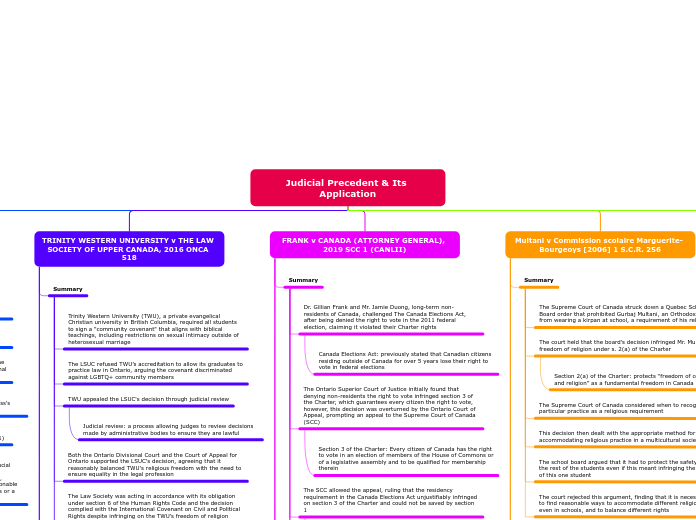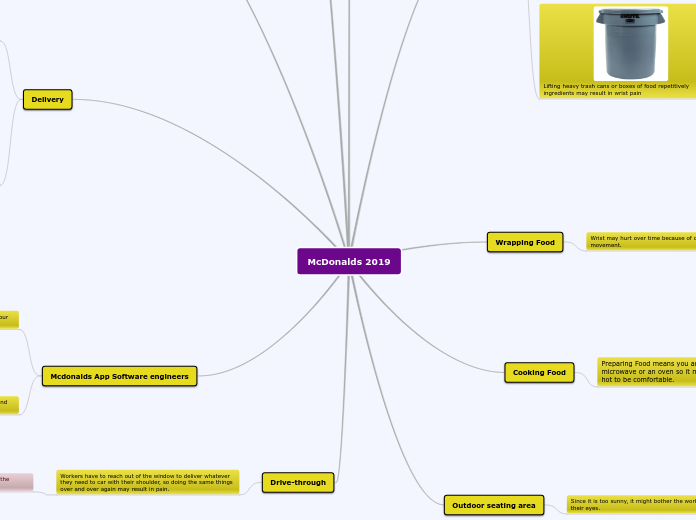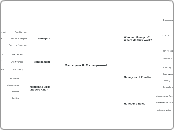Judicial Precedent & Its Application
Eldridge v. British Columbia (Attorney General) [1997] 3 S.C.R. 624
Reflects the belief that laws should ensure fundamental human rights and equality, aligning with natural law's emphasis on inherent rights
Demonstrates substantive law through the application of rights under the Charter, emphasizing equality
Fosters inclusivity and standardization in service access
Ensures consistent legal framework for disability accommodations
Promotes reliance on judicial decisions
Substantive equality necessitates accommodations like sign language interpreters for deaf individuals to have equal access to healthcare
Discrimination under Section 15(1) of the Canadian Charter due to lack of sign language interpretation for deaf patients in healthcare
15(1): Every individual is equal before and under the law and has the right to the equal protection and equal benefit of the law without discrimination and, in particular, without discrimination based on race, national or ethnic origin, colour, religion, sex, age or mental or physical disability.
Emphasized differential treatment to ensure equal access to services for individuals with disabilities
Recognized that equality may require accommodating differences, especially in healthcare
Landmark precedent on substantive equality in Canadian law
For deaf patients to receive the same level of basic health care as other patients, they required sign language interpreters; this is called substantive equality
In this decision, the Supreme Court of Canada recognized that sometimes, equal treatment requires different services for different groups
They claimed discrimination based on disability because B.C. failed to fund sign language interpretation during doctor visits
The plaintiffs in this case were born deaf and used sign language to communicate
Multani v Commission scolaire Marguerite- Bourgeoys [2006] 1 S.C.R. 256
Showcases legal realism by considering the practical implications of laws and judicial decisions on religious freedoms and the real-life impacts on students
Highlights the balance between individual rights (to express religious beliefs) and the duties of public institutions to accommodate these rights equitably, aligning with the topics of rights and duties as well as equality and equity
Sets expectations for religious freedoms vs. institutional policies balance
Clarifies rights in multicultural and public institution settings
Helps people know what to expect regarding religious accommodation
Rejected the notion that individual rights can be ignored without thorough consideration of less intrusive ways to provide accommodation
Emphasized the importance of seeking reasonable accommodations that respect religious practices without compromising public safety
The school board's prohibition on wearing a kirpan infringed on Multani's freedom of religion as protected under Section 2(a) of the Charter
Demonstrated the Supreme Court's commitment to protecting religious practices under the Charter
Highlighted the necessity of balancing individual rights to religious freedom with broader public safety concerns in educational settings
Established precedent on religious freedom and accommodation in Canadian schools
The court rejected this argument, finding that it is necessary to find reasonable ways to accommodate different religions, even in schools, and to balance different rights
The school board argued that it had to protect the safety of the rest of the students even if this meant infringing the rights of this one student
This decision then dealt with the appropriate method for accommodating religious practice in a multicultural society
The Supreme Court of Canada considered when to recognize a particular practice as a religious requirement
The court held that the board’s decision infringed Mr. Multani’s freedom of religion under s. 2(a) of the Charter
Section 2(a) of the Charter: protects “freedom of conscience and religion” as a fundamental freedom in Canada
The Supreme Court of Canada struck down a Quebec School Board order that prohibited Gurbaj Multani, an Orthodox Sikh, from wearing a kirpan at school, a requirement of his religion
FRANK v CANADA (ATTORNEY GENERAL), 2019 SCC 1 (CANLII)
Illustrates positive law through the adherence to constitutional and statutory provisions that define and protect voting rights, focusing on the enacted laws themselves rather than broader moral principles
Highlights the topic of democracy, asserting that citizenship, not residency, confers the right to vote, impacting national sovereignty and jurisdiction
Ensures global understanding of Canadian democratic values
Reinforces fundamental nature of voting rights for all citizens
Promotes predictable and consistent legal principles on voting rights
The infringement was not proportional to the law's objective of maintaining election fairness, lacking rational connection and unjustifiably impacting the rights of non-resident Canadians
The residency requirement in the Canada Elections Act violated Section 3 of the Charter and was not justified under Section 1
Overturned legislation that disenfranchised Canadian citizens living abroad for more than 5 years, emphasizing the broad scope of voting rights under the Charter
Affirmed the fundamental right to vote for Canadian citizens, regardless of their residence duration outside of Canada
This decision emphasizes the importance of inclusivity in electoral processes and the principle that citizenship, rather than residency, is the key determinant of the right to vote
The court highlighted the lack of evidence that non-resident voting compromised election fairness and noted that many non-residents maintain strong ties to Canada, including paying taxes and receiving social benefits, thus deserving a say in government decisions
The Act's goal of maintaining electoral fairness for Canadian residents was deemed important but not sufficiently pressing to justify the broad disenfranchisement of non-resident citizens
The SCC allowed the appeal, ruling that the residency requirement in the Canada Elections Act unjustifiably infringed on section 3 of the Charter and could not be saved by section 1
Section 1 of the Charter: Charter rights can be limited by law so long as those limits can be shown to be reasonable in a free and democratic society
The Ontario Superior Court of Justice initially found that denying non-residents the right to vote infringed section 3 of the Charter, which guarantees every citizen the right to vote, however, this decision was overturned by the Ontario Court of Appeal, prompting an appeal to the Supreme Court of Canada (SCC)
Section 3 of the Charter: Every citizen of Canada has the right to vote in an election of members of the House of Commons or of a legislative assembly and to be qualified for membership therein
Dr. Gillian Frank and Mr. Jamie Duong, long-term non-residents of Canada, challenged The Canada Elections Act, after being denied the right to vote in the 2011 federal election, claiming it violated their Charter rights
Canada Elections Act: previously stated that Canadian citizens residing outside of Canada for over 5 years lose their right to vote in federal elections
TRINITY WESTERN UNIVERSITY v THE LAW SOCIETY OF UPPER CANADA, 2016 ONCA 518
Connections
Applies critical legal theory by questioning the power dynamics and societal structures that influence legal decisions, specifically in the context of LGBTQ+ rights
Showcases the topics of law and justice as well as humanity and morality, particularly regarding the balance between religious freedoms and anti-discrimination principles
Judicial Precedence Importance
Illustrates careful legal and ethical issue navigation within legal precedents
Ensures decisions grounded in Charter values, not arbitrary
Limits power of the judiciary through adherence to established legal principles
Ratio Decendi
Although TWU's freedom of religion was infringed, this was justified by the broader public interest in maintaining an equitable and inclusive legal profession
The Law Society's refusal to accredit TWU's law school was a reasonable balance between TWU's religious freedom and the statutory objective to ensure equal access to legal education
Legal Significance
Emphasized the role of legal institutions in upholding equality in access to the profession, setting a precedent for how religious freedom is balanced against other Charter rights
Addressed the conflict between freedom of religion and anti-discrimination principles within the context of professional accreditation
This decision set a precedent on how religious freedoms are balanced against equality rights in Canada
The Law Society was acting in accordance with its obligation under section 6 of the Human Rights Code and the decision complied with the International Covenant on Civil and Political Rights despite infringing on the TWU’s freedom of religion
Both the Ontario Divisional Court and the Court of Appeal for Ontario supported the LSUC's decision, agreeing that it reasonably balanced TWU's religious freedom with the need to ensure equality in the legal profession
TWU appealed the LSUC's decision through judicial review
Judicial review: a process allowing judges to review decisions made by administrative bodies to ensure they are lawful
The LSUC refused TWU’s accreditation to allow its graduates to practice law in Ontario, arguing the covenant discriminated against LGBTQ+ community members
Trinity Western University (TWU), a private evangelical Christian university in British Columbia, required all students to sign a "community covenant" that aligns with biblical teachings, including restrictions on sexual intimacy outside of heterosexual marriage
R. v BINGLEY, 2017 SCC 12
Summary
This decision highlights judiciary's trust in standardized training programs for law enforcement against drug-impaired driving and raises debate on judicial efficiency versus the need for scientific scrutiny
New trial ordered for Bingley, legal recognition of DRE training as expert knowledge
Majority viewed DRE testimony's benefits as outweighing potential costs
Requiring a voir dire for DRE testimony deemed unreasonable and a waste of judicial resources
DREs recognized for special expertise in drug impairment recognition, beyond the judge's knowledge
DRE's opinion on impairment, although formed through specialized training, is considered an "investigative tool," not direct evidence
The Supreme Court of Canada decided a voir dire was not necessary for DRE testimony under Criminal Code s. 254(3.1)
Section 254(3.1) of the Criminal Code of Canada: a crucial provision that empowers peace officers to demand an evaluation of an individual's ability to operate a vehicle, vessel, aircraft, or railway equipment if they have reasonable grounds to believe that the person is impaired by drugs or a combination of drugs
Initially, Mr. Bingley was acquitted but appeals questioned the need for voir dire to assess DRE's expertise under the Criminal Code
Voir dire: a preliminary examination of an expert witness's qualifications
DRE's evaluation found cannabis, cocaine, and alprazolam which Bingley admitted using in the past 12 hours
In 2009, Mr. Bingley was arrested for impaired driving after failing a drug recognition expert (DRE) test, despite passing alcohol screening









